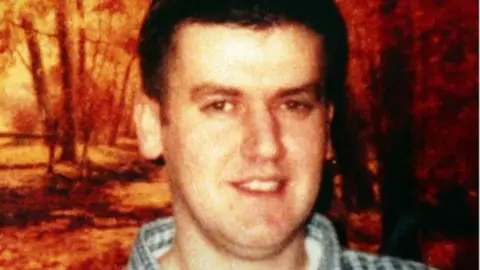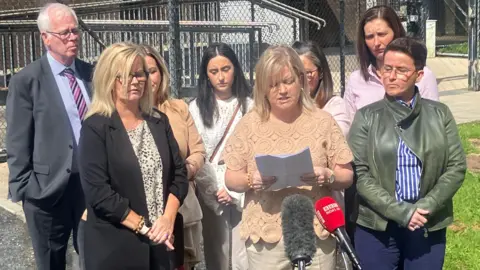[ad_1]
By Cormac Campbell, BBC News NI south-east reporter • Catherine Moore, BBC News NI
 BBC
BBCA former police officer has been sentenced to 12 months in prison for conspiring to pervert the course of justice in connection with a sectarian killing in 1997.
Robert Hamill, a 25-year-old Catholic, died after he was beaten by loyalists in Portadown, County Armagh.
Robert Cecil Atkinson, 71, from Brownstown Road in Portadown, appeared before Craigavon Crown Court on Friday.
The former reserve constable admitted giving false information to police who were investigating a phone call made from his home on 27 April, the day of the attack.
Mr Hamill died of his injuries on 8 May 1997.
On Friday, the judge said Atkinson had been “a disgrace to [his] uniform”.
‘Wrong doing and cover up’
Afterwards, Mr Hamill’s family have called for a date to be set for the release of the findings of a public inquiry into his death.
His sister, Diane Hamill, said there has been “a lot of wrong doing and cover up”, adding that “hopefully the inquiry will shed more light on that”.
She said: “This could have been over decades ago if people had been honest about what they did.”
Ms Hamill added that the family is “somewhat content with the conviction and sentence” but “there is a lot of sadness with us”.
“We lost our mum a few weeks ago and this would have meant so much to her. We’re pleased that justice, some, minimal, a bit of justice has been seen to be done.”

Atkinson had pleaded guilty in April to conspiring with Andrea Louise McKee and James Michael Robert McKee, who have previously been convicted, as well as others to do an act which had a tendency to pervert the course of justice.
This related to giving false information in relation to the identity of the person making the 27 April phone call.
What happened to Robert Hamill?
Mr Hamill and a friend were attacked and beaten by loyalists as they walked along Portadown’s Market Street after a night out.
Mr Hamill, a father-of-three, suffered serious head injuries and died 11 days after the attack.
Prosecution barrister Toby Hedworth KC previously told the court that when the attack occurred at about 01:45 BST “an RUC land rover was parked nearby” and “one of the crew was Robert Atkinson”.
Atkinson was a reserve constable at the time.
The public inquiry
Mr Hamill’s murder was the subject of a public inquiry, because it was alleged that police officers were positioned in the police vehicle but did not intervene.
In 2004 the then Northern Ireland Secretary Paul Murphy announced the terms of reference for the inquiry into the death of Mr Hamill.
That inquiry ran for 77 days between 13 January and 17 December 2009.
However, the report from the inquiry will not be published until the conclusion of any legal proceedings.
 Pacemaker
PacemakerAllister Hanvey was one of six people later charged with murder but this charge was later withdrawn due to insufficient evidence.
Mr Hedworth said that police had received information that Atkinson had tipped Mr Hanvey off about the investigation. He was interviewed about it at the time and denied making the call.
The court heard that subsequent enquiries revealed a call had been made at 08:37 and that a second call was made a week later.
Mr Hedworth had told the court that Atkinson “was interviewed again and gave an explanation”.
Mr Hedworth said: “He said a young couple, Andrea and Michael McKee, had been staying at his house and that Michael McKee had called the Hanvey home to enquire about the wellbeing of his niece – Hanvey’s girlfriend – because he had heard ‘about a commotion the night before’.”
The court heard that the second call related to a discussion about martial arts.
‘You have been a disgrace to your uniform’
The court heard that at the time, this version of events had been supported by the McKees but after their marriage broke down Ms McKee provided a fresh statement in 2000 saying they had not been in the house and that Atkinson had asked for a cover story.
Mr McKee then agreed that this second statement was correct. Both Andrea and Michael McKee were convicted in May 2002.
In mitigation, Atkinson’s defence barrister Barry Gibson KC had said that the court had not established what the content of the call was, that there had been a 27-year gap since the offence and that Atkinson’s health was poor.
On Friday, judge Patrick Lynch KC said the court could draw inferences from the failure to disclose what the exact nature of the call was.
“It is a disgrace that you, as a serving police officer, should stoop so low as to deliberately mislead an investigation which you knew concerned a serious assault that you had witnessed,” he said.
“Ultimately it turned into a murder inquiry in which a son of the household you contacted was a suspect.
“The public are entitled to the highest degree of probity in those entrusted to police and enforce the law.
“You have been a disgrace to your uniform and have continued to serve as a police officer for years afterwards as a criminal – for there is no other description for you.”
[ad_2]
Source link freeslots dinogame telegram营销




